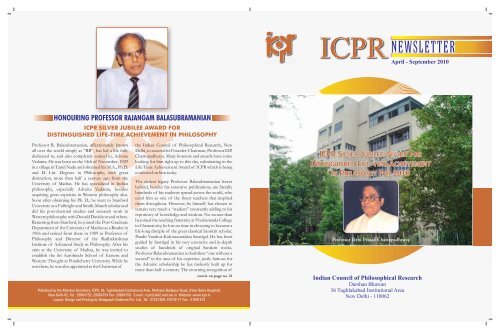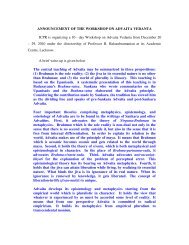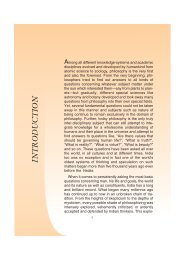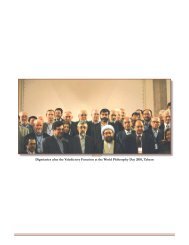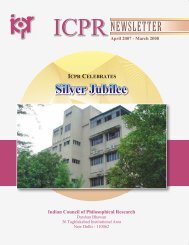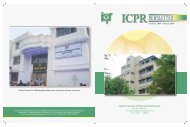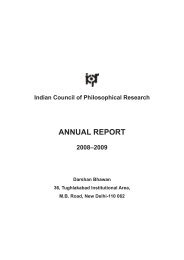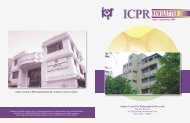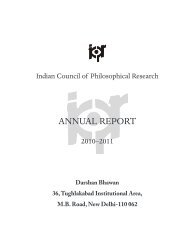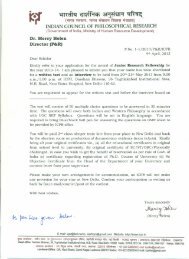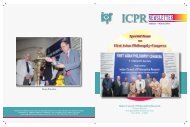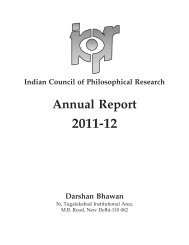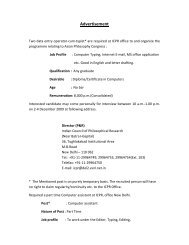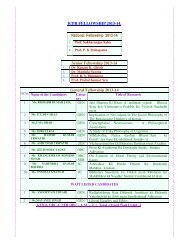Newsletter - Indian Council of Philosophical Research
Newsletter - Indian Council of Philosophical Research
Newsletter - Indian Council of Philosophical Research
You also want an ePaper? Increase the reach of your titles
YUMPU automatically turns print PDFs into web optimized ePapers that Google loves.
ICPR<br />
April<br />
<strong>Newsletter</strong><br />
- September 2010<br />
HONOURING PROFESSOR RAJANGAM BALASUBRAMANIAN<br />
ICPR SILVER JUBILEE AWARD FOR<br />
DISTINGUISHED LIFE-TIME ACHIEVEMENT IN PHILOSOPHY<br />
Pr<strong>of</strong>essor R. Balasubramanian, affectionately known<br />
all over the world simply as “RB”, has led a life fully<br />
dedicated to, and also completely soaked in, Advaita<br />
Vedanta. He was born on the 14th <strong>of</strong> November, 1929<br />
in a village in Tamil Nadu and obtained his M.A., Ph.D.<br />
and D. Litt. Degrees in Philosophy, with great<br />
distinction, more than half a century ago from the<br />
University <strong>of</strong> Madras. He has specialized in <strong>Indian</strong><br />
philosophy, especially Advaita Vedanta, besides<br />
acquiring great expertise in Western philosophy also.<br />
Soon after obtaining his Ph. D., he went to Stanford<br />
University as a Fulbright and Smith-Mundt scholar and<br />
did his post-doctoral studies and research work in<br />
Western philosophy with Donald Davidson and others.<br />
Returning from Stanford, he joined the Post-Graduate<br />
Department <strong>of</strong> the University <strong>of</strong> Madras as a Reader in<br />
1966 and retired from there in 1989 as Pr<strong>of</strong>essor <strong>of</strong><br />
Philosophy and Director <strong>of</strong> the Radhakrishnan<br />
Institute <strong>of</strong> Advanced Study in Philosophy. After his<br />
stint at the University <strong>of</strong> Madras, he was invited to<br />
establish the Sri Aurobindo School <strong>of</strong> Eastern and<br />
Western Thought at Pondicherry University. While he<br />
was there, he was also appointed as the Chairman <strong>of</strong><br />
the <strong>Indian</strong> <strong>Council</strong> <strong>of</strong> <strong>Philosophical</strong> <strong>Research</strong>, New<br />
Delhi, to succeed its Founder-Chairman, Pr<strong>of</strong>essor D.P.<br />
Chattopadhyaya. Many honours and awards have come<br />
looking for him right up to this day, culminating in the<br />
Life Time Achievement Award <strong>of</strong> ICPR which is being<br />
conferred on him today.<br />
The richest legacy Pr<strong>of</strong>essor Balasubramanian leaves<br />
behind, besides his extensive publications, are literally<br />
hundreds <strong>of</strong> his students spread across the world, who<br />
extol him as one <strong>of</strong> the finest teachers that inspired<br />
them throughout. However, he himself has chosen to<br />
remain very much a “student” constantly adding to his<br />
repository <strong>of</strong> knowledge and wisdom. No sooner than<br />
he joined the teaching fraternity at Vivekananda College<br />
in Chennai city, he lost no time in choosing to become a<br />
life-long disciple <strong>of</strong> the great classical Sanskrit scholar,<br />
Pandit Varahur Kalyanasundara Sastrigal. He has been<br />
guided by Sastrigal in his very extensive and in-depth<br />
studies <strong>of</strong> hundreds <strong>of</strong> original Sanskrit works.<br />
Pr<strong>of</strong>essor Balasubramanian is doubtless “one without a<br />
second” in the area <strong>of</strong> his expertise, justly famous for<br />
the Advaitic scholarship he has tirelessly built up for<br />
more than half a century. The crowning recognition <strong>of</strong><br />
contd. on page no. 21<br />
Published by the Member-Secretary, ICPR, 36, Tughlakabad Institutional Area, Mehrauli-Badarpur Road, (Near Batra Hospital),<br />
New Delhi-62, Tel : 29964753, 29964754 Fax: 29964750. E-mail : icpr@del2.vsnl.net.in Website: www.icpr.in<br />
Layout, Design and Printing by Datagraph Creations Pvt. Ltd., Tel : 27221409, 47019171 Fax : 47091473<br />
ICPR SILVER JUBILEE AWARD FOR<br />
DISTINGUISHED LIFE-TIME ACHIEVEMENT<br />
IN PHILOSOPHY FOR 2010<br />
Pr<strong>of</strong>essor Debi Prasad Chattopadhyaya<br />
<strong>Indian</strong> <strong>Council</strong> <strong>of</strong> <strong>Philosophical</strong> <strong>Research</strong><br />
Darshan Bhawan<br />
36 Tughlakabad Institutional Area<br />
New Delhi - 110062
Life-time Achievement Award<br />
Honouring ICPR Silver Jubilee Award For Distinguished<br />
Life-time Achievement In Philosophy For 2010<br />
Pr<strong>of</strong>essor Debi Prasad Chattopadhyaya<br />
Pr<strong>of</strong>essor Debi Prasad Chattopadhyaya is a person<br />
with an astonishing array <strong>of</strong> achievements in diverse<br />
areas. We in the <strong>Indian</strong> philosophical community are<br />
proud to bask in his many splendored glories as a<br />
philosopher statesman like Dr. S. Radhakrishnan and<br />
Dr. Karan Singh. Dr. Chattopadhyaya is an encyclopaedic<br />
scholar in philosophy, history <strong>of</strong> science and<br />
social sciences. Indeed, he was also a practising politician<br />
and academic leader, an unusual combination <strong>of</strong><br />
both.<br />
Born in East Bengal in 1931, Pr<strong>of</strong>essor Chattopadhyaya<br />
had his education at the University <strong>of</strong> Calcutta<br />
and the London School <strong>of</strong> Economics where he<br />
studied and excelled in law, philosophy and history.<br />
He researched, studied and taught for forty years at<br />
various universities <strong>of</strong> India, Europe and USA from<br />
1954 to 1994. Besides being the Union Cabinet<br />
Minister <strong>of</strong> Commerce and later on as the Governor<br />
<strong>of</strong> Rajasthan, he was the founder Chairman <strong>of</strong> the<br />
<strong>Indian</strong> <strong>Council</strong> <strong>of</strong> <strong>Philosophical</strong> <strong>Research</strong> (1981-<br />
1990) and also the President-cum-Chairman, <strong>Indian</strong><br />
Institute <strong>of</strong> Advanced Study, Shimla. Currently, as the<br />
Director <strong>of</strong> multi-disciplinary 100 volumes Project<br />
<strong>of</strong> History <strong>of</strong> Science, Philosophy and Culture in<br />
<strong>Indian</strong> Civilizations (PHISPC) and as the Chairman<br />
<strong>of</strong> the Centre for Studies in Civilizations (CSC), he<br />
has been actively engaged in research in the science<br />
and philosophy <strong>of</strong> world civilizations. He is a Life<br />
Member <strong>of</strong> the Russian Academy <strong>of</strong> Sciences and a<br />
Member <strong>of</strong> the International Institute <strong>of</strong> Philosophy,<br />
Paris. He is also a National Distinguished Pr<strong>of</strong>essor at<br />
Andhra University, Waltair. Besides the above, he was<br />
the Chairman <strong>of</strong> Raja Rammohun Roy Library Foundation,<br />
Calcutta, <strong>of</strong> the First International Conference<br />
on Buddhism and National Culture, and also <strong>of</strong> the<br />
<strong>Indian</strong> <strong>Philosophical</strong> Congress. Not only Pr<strong>of</strong>essor<br />
Chattopadhyaya has earned a name for himself, but<br />
he has also glorified the name <strong>of</strong> this country by his<br />
contributions in the fields <strong>of</strong> philosophy and culture.<br />
With all the achievement as a scholar and a thinker,<br />
Pr<strong>of</strong>essor Chattopadhyaya is a model <strong>of</strong> a unique<br />
combination <strong>of</strong> academic excellence, active statesmanship<br />
and astute leadership, which is very difficult<br />
to achieve and even more difficult to excel.<br />
Pr<strong>of</strong>essor Chattopadhyaya, with his wide knowledge<br />
<strong>of</strong> philosophy, political theory, economics, history,<br />
and science is one <strong>of</strong> the leading propounders <strong>of</strong><br />
interdisciplinary studies in our country. Pr<strong>of</strong>essor<br />
Chattopadhyaya is the author <strong>of</strong> 18 books, editor<br />
<strong>of</strong> 17 other volumes and the author <strong>of</strong> about 200<br />
research articles. He was the founder Editor <strong>of</strong> the<br />
Journal <strong>of</strong> <strong>Indian</strong> <strong>Council</strong> <strong>of</strong> <strong>Philosophical</strong> <strong>Research</strong><br />
and he is presently editing the journal named Sandhan,<br />
the journal <strong>of</strong> the PHISPC. For his contribution in<br />
the fields <strong>of</strong> education and culture, he was conferred<br />
national civilian titles like Padmabhushan and Padmavibhushan<br />
by the President <strong>of</strong> India. A large number<br />
<strong>of</strong> universities in the country also conferred honorary<br />
D.Litt. degrees on him in recognition <strong>of</strong> his scholarship,<br />
leadership and statesmanship.<br />
In recognition <strong>of</strong> his outstanding contributions to<br />
the field <strong>of</strong> philosophy, interdisciplinary research in<br />
human sciences, the study <strong>of</strong> science and cultures, and<br />
also his unceasing efforts in bringing about increasing<br />
awareness about science, society and <strong>Indian</strong> culture,<br />
the <strong>Indian</strong> <strong>Council</strong> <strong>of</strong> <strong>Philosophical</strong> <strong>Research</strong> feels<br />
honoured to confer upon Pr<strong>of</strong>essor Debi Prasad<br />
Chattopadhyaya the ICPR Silver Jubilee Life-Time<br />
Achievement Award for the year 2010.
From Member-Secretary’s Desk<br />
At the outset, I am delighted to inform you<br />
that the ICPR Silver Jubilee Awards for<br />
Distinguished Life-time Achievement in<br />
Philosophy for the years 2009 and 2010 have been<br />
conferred on Pr<strong>of</strong>essors R. Balasubramanian and D.P.<br />
Chattopadhyaya respectively. Known for their contribution<br />
to Philosophy and <strong>Philosophical</strong> research and<br />
also their involvement in the promotion <strong>of</strong> Philosophy<br />
in the sub-continent, both were the unanimous<br />
choices <strong>of</strong> the Committee as well as the <strong>Council</strong>. I am<br />
equally delighted to inform you that Dr. Manmohan<br />
Singh, our Prime Minister has spared his very valuable<br />
time and kindly agreed to present the awards and the<br />
function has been scheduled to be held on December<br />
22, 2010. We have the privilege to have the graceful<br />
presence <strong>of</strong> the Union HRD Minsiter, Shri Kapil Sibal<br />
who has very kindly agreed to inaugurate ICPR Annual<br />
Fellows’ Meet following the Awards function.<br />
This <strong>Newsletter</strong> carries reports on the events and<br />
programs <strong>of</strong> last six months (April to September<br />
2010), which happen to be the last two quarters <strong>of</strong> my<br />
first term as the Member Secretary. It is three years<br />
back that I joined the <strong>Council</strong> as its Member Secretary<br />
and during this period, I have tried my best to<br />
do whatever I could to further the activities <strong>of</strong> ICPR.<br />
In carrying out my responsibilities and implementing<br />
the decisions <strong>of</strong> the <strong>Council</strong>, I am aware that I have<br />
earned admirers as well as staunch critics for taking<br />
certain innovative and non-conventional initiatives<br />
aimed at bringing reforms that have been truly challenging.<br />
Although I do not deny my own role in all this<br />
as the executing <strong>of</strong>ficer, still whatever has happened in<br />
the <strong>Council</strong> is truly because <strong>of</strong> the approval and cooperation<br />
<strong>of</strong> all the Members <strong>of</strong> the <strong>Council</strong> to whom<br />
alone all credit should really go.<br />
One <strong>of</strong> the major achievements during this period is<br />
the rehabilitation <strong>of</strong> the Lucknow Centre which was<br />
almost defunct after Supreme Court verdict in 2005<br />
ordering it to vacate the Butler Palace, which housed the<br />
Academic Centre and its exclusive Library on Philosophy<br />
for more than 20 years since 1981. It was vacated<br />
immediately after the court order without getting a<br />
proper alternative, nor even going for an appeal for<br />
any legal relief and as a result the books were dumped<br />
in a totally unsuitable place---an ignominy for the<br />
library which used to be place <strong>of</strong> pride for the whole<br />
philosophical community <strong>of</strong> the country. As a student<br />
and during my early career as a young faculty at the<br />
Radhakrishnan Institute <strong>of</strong> Advanced Study in Philosophy,<br />
I remember the enthusiasm and interest with<br />
which I as well as many <strong>of</strong> my contemporaries looked<br />
forward to coming to Lucknow and how the centre<br />
had helped us getting the required research material<br />
we needed. After becoming MS, my top priority was<br />
the rehabilitation <strong>of</strong> the Academic Centre and there<br />
was partial success in getting the present building at<br />
Gomti Nagar although it did not have all the facilities<br />
that were available in Butler Palace. The new building<br />
is only sufficient to stack the books and journals so<br />
carefully selected and procured by the former <strong>of</strong>fice<br />
bearers especially Pr<strong>of</strong>essor R.R. Verma, the former<br />
Director <strong>of</strong> the Academic centre.<br />
In getting this place for the Academic Centre, I must<br />
thank the personal involvement and interest <strong>of</strong> our<br />
Chairman, Pr<strong>of</strong>essor K. Ramakrishna Rao, who was<br />
not only the driving force behind all the activities we<br />
proposed but kept on advising and monitoring the<br />
progress. The interest shown and guidance given by<br />
Sri Sunil Kumar, Joint Secretary MHRD and Sri V.S.<br />
Pandey, Special Secretary, Government <strong>of</strong> UP cannot<br />
be gainsaid since neither <strong>of</strong> them showed any reluc-
tance in involving themselves in the rehabilitation <strong>of</strong><br />
the Centre. My hearty thanks are due to them for their<br />
time and involvement. I would also place on record my<br />
gratitude to Sri Mukesh Meshram and Sri Maniprasad<br />
Mishra, not only for fulfilling all <strong>of</strong>ficial formalities to<br />
get the new premises from Lucknow Development<br />
Authority at a very nominal lease rent for 99 years, but<br />
also for constructing a conference hall on the secondfloor.<br />
Our next target was to get a piece <strong>of</strong> land<br />
from LDA or Lucknow Govt. to build the permanent<br />
facilities for the Centre which were there previously at<br />
Butler Palace and also to start the <strong>Indian</strong> Institute for<br />
Philosophy, which is seriously contemplated by our<br />
Chairman.<br />
With Lucknow Centre built up, we wanted to start<br />
activities and posted <strong>of</strong>ficers there to augment our<br />
academic activities and finally two <strong>of</strong> our senior <strong>of</strong>ficers<br />
have joined after their initial reluctance. In any<br />
organisation, the development depends not on just<br />
man-power but on the initiative and interest <strong>of</strong> the<br />
<strong>of</strong>ficers who can multiply the programs and projects.<br />
In ICPR, barring a very few, I must say that the <strong>of</strong>ficers<br />
have stood up to the test <strong>of</strong> time and tirelessly worked<br />
and cooperated to the maximum for translating the<br />
<strong>Council</strong>’s ideas into reality.<br />
The project for providing the E-catalogue <strong>of</strong> books<br />
and journals at the Academic Centre initiated by<br />
Pr<strong>of</strong>essor Srinivasa Rao is completed and now interested<br />
researchers as well as the public can view the<br />
catalogue on line. Efforts are on for procuring e-journals<br />
and JSTORE for providing better facility to our<br />
library users.<br />
Another major achievement is the successful organisation<br />
<strong>of</strong> the Asian Philosophy Congress which<br />
Pr<strong>of</strong>essor Rao has conceptualised and had been trying<br />
to realise since he joined as the Chairman. The event<br />
took place during March 6-9, 2010 with the participation<br />
<strong>of</strong> more than 700 scholars from India and abroad<br />
giving a facelift and identity to Asian thinking. I would<br />
also like to inform you that in the last Congress it was<br />
decided to continue this forum for Asian Philosophy<br />
by organising such meets at different destinations<br />
throughout Asia and Pr<strong>of</strong>essor Ramakrishna Rao has<br />
been unanimously elected to be the next President <strong>of</strong><br />
the Congress.<br />
In order to augment our activities with the small budget<br />
that we have been sanctioned by the MHRD, we have<br />
sought collaborations from other sister organisations<br />
and like-minded bodies and I take this opportunity to<br />
thank all <strong>of</strong> them. These include UNESCO New Delhi,<br />
IIAS, Shimla, ICSSR, ICHR besides grants from many<br />
universities and research Institutions. In view <strong>of</strong> our<br />
impressive track record, we have reasonable hope that<br />
our budget will be substantially increased so that we<br />
may achieve new goals and do more for Philosophy in<br />
the country.<br />
On the <strong>of</strong>fice front, Ms. Anupama Thakur has joined<br />
as the Director <strong>of</strong> Administration and Finance in the<br />
month <strong>of</strong> August and I hope she would be able to<br />
stand up to our requirements and deliver the goods<br />
to our satisfaction. The work <strong>of</strong> renovation given<br />
to CPWD is yet to be completed even though two<br />
years have passed after the work assignment and I am<br />
looking forward to early completion <strong>of</strong> the renovation<br />
work.<br />
After my first term <strong>of</strong> three years which is completed<br />
in September 2010, my services are continued for one<br />
more term. Finally, I thank our chairman, Members<br />
<strong>of</strong> the <strong>Council</strong> and the Ministry <strong>of</strong>ficials for their<br />
uniform kindness and courtesy and more than that,<br />
the trust they have reposed in me which has worked<br />
as the driving force for me to shoulder the responsibilities,<br />
face challenges and go ahead with the new<br />
programmes and initiatives to make ICPR much more<br />
useful for the academic community <strong>of</strong> this country.<br />
G. Mishra<br />
Member Secretary
Chairman’s Speech<br />
Pr<strong>of</strong>essor K. Ramakrishna Rao, Chairman, ICPR<br />
Dr. Manmohan Singh ji, Hon’ble Prime Minister, Shri<br />
Kapil Sibal ji, Hon’ble Minister <strong>of</strong> Human Resource<br />
Development, Dr. Karan Singh ji, Pr<strong>of</strong>essor Chattopadhyaya,<br />
Pr<strong>of</strong>essor Balasubramanian, distinguished<br />
guests, Members <strong>of</strong> the ICPR family, Ladies and<br />
Gentlemen.<br />
On behalf <strong>of</strong> the ICPR and on my own behalf I<br />
extend to you, Mr. Prime Minister, Dr. Manmohan<br />
Singh ji and to you our own Minister Shri Sibal ji, our<br />
warm welcome this morning to this modest function.<br />
We recognize that the ICPR is too small an organization<br />
to attract the attention <strong>of</strong> a busy Prime Minister<br />
<strong>of</strong> a country as big as ours. However, we ventured to<br />
invite you, Sir, because we know that you are not just<br />
a Prime Minister. You are an academician at heart and<br />
a thinker by disposition. So, we see you as a member<br />
<strong>of</strong> our fraternity; and are justly proud that you are not<br />
only our Prime Minister but also the chief architect<br />
<strong>of</strong> India’s liberalized economic policies that put our<br />
country at the forefront <strong>of</strong> economic expansion and<br />
unprecedented growth. More importantly, I believe,<br />
you and your government will be remembered for what<br />
you have done for education. The right to education<br />
act, the manifold increase in the education budget to<br />
open up educational opportunities to unprecedented<br />
numbers from all sections <strong>of</strong> the society and the far<br />
reaching reforms in educational administration that<br />
are contemplated to promote excellence and equity <strong>of</strong><br />
access will lead India forward as nothing else would.<br />
ICPR hopes to play its little part in helping to translate<br />
your vision into reality and your thoughts into action.<br />
One <strong>of</strong> the continuing challenges is the modern man’s<br />
existential predicament, the asymmetry between our<br />
knowledge <strong>of</strong> “external” and “inner” worlds, between<br />
what we see around and what we experience within.<br />
There is a frightening gap between our enormous<br />
ability to control and exploit the physical forces and<br />
our dismal failure to deal with ourselves. Then, there<br />
is also the worrying gap between the values we preach<br />
and actually we practice in life. All these appear to<br />
be a consequence <strong>of</strong> the extraordinary success in<br />
conquering the external world and the misplaced belief<br />
that the “inner” world <strong>of</strong> the mind can be understood<br />
in a similar manner and with the same methods.<br />
The sage <strong>of</strong> twentieth century and the father <strong>of</strong> our<br />
nation, Mahatma Gandhi, was acutely aware <strong>of</strong> this.<br />
His thought and action were attempts to correct this<br />
asymmetry and imbalance and bridge the gap between
the knowledge <strong>of</strong> ourselves and <strong>of</strong> the external world.<br />
Therefore, Gandhian studies are among the thrust<br />
areas, the ICPR is encouraging.<br />
Another challenge before us is the extra-ordinary<br />
diversity manifest in many ways in the country. It can<br />
be a boon to build a colourful coalition <strong>of</strong> coexisting<br />
identities and make India a showcase <strong>of</strong> sustainable<br />
pluralism. Or it can bust the very integrity <strong>of</strong> the<br />
nation. I believe, we philosophers can develop appropriate<br />
models to analyze this complex situation and<br />
find ways <strong>of</strong> moving in the desirable directions.<br />
Ours is not merely a nation <strong>of</strong> wide diversities. It is<br />
a country <strong>of</strong> great contrasts and deep paradoxes. We<br />
have been living with them. Mr. Prime Minister, Sir,<br />
if I may take the liberty to say so, you yourself is an<br />
example <strong>of</strong> a striking paradox. You are not a politician<br />
by instinct or training. Yet, you are the elected Prime<br />
Minister <strong>of</strong> the largest democracy in the world. Again,<br />
the country is arguably one that scores high on corruption.<br />
Our integrity rating is said to be as low as 3.3 on a<br />
scale <strong>of</strong> 10. The recently concluded Common Wealth<br />
Games are a painful reminder. Yet, we have in you a<br />
Prime Minister who is globally acclaimed for impeccable<br />
integrity scoring 10 on 10. As Bill Burns so aptly<br />
observed the other day, on the occasion <strong>of</strong> presenting<br />
the best world statesman award to you, “there could<br />
be no better choice, no better model <strong>of</strong> what integrity<br />
and statesmanship are all about on the world stage.”<br />
Behind the silky layer <strong>of</strong> your gentle demeanour and<br />
rare humility, sometimes mistakenly taken as weakness,<br />
lie your real strength, the steely determination,<br />
long term vision and wisdom guided action.<br />
I mention paradoxes here because paradoxes are the<br />
play fields <strong>of</strong> philosophers. The history <strong>of</strong> philosophy<br />
is itself a story <strong>of</strong> playing with paradoxes such as<br />
seeking being in nonbeing, searching for permanence<br />
in the midst <strong>of</strong> change, striving for knowledge and<br />
bliss while seeing that we are situated in a state <strong>of</strong> ignorance<br />
and suffering. Classical <strong>Indian</strong> philosophy is a<br />
relentless pursuit to dissolve such paradoxes. Indeed,<br />
it is a characteristic <strong>of</strong> <strong>Indian</strong> tradition to bring about<br />
a magical synthesis <strong>of</strong> contraries.<br />
Philosophy began as a search for the “really real”, to<br />
learn about the reality behind appearances. Thus, it was<br />
the mother <strong>of</strong> all sciences. At the time <strong>of</strong> Plato and<br />
Aristotle physics was a part <strong>of</strong> philosophy. However,<br />
with the emergence <strong>of</strong> specialized sciences, philosophy<br />
finds itself empty and barren <strong>of</strong> subject areas<br />
to study. Ontological metaphysics itself has come to<br />
be seen increasingly, to quote the American philosopher,<br />
C.S.Pierce, “either meaningless gibberish” or<br />
else “downright absurd.” So, we find philosophers<br />
move away from the search for the “really real” and<br />
focus their attention on concepts and their meaning.<br />
Finding conceptual confusions and clearing them have<br />
become the subject-matter <strong>of</strong> philosophy. Philosophers<br />
have become self-certified therapists to treat<br />
confused minds and clear the congested cognitive<br />
systems. This has served its purpose and the limitations<br />
<strong>of</strong> this approach have now become all too<br />
obvious. Philosophy is on the threshold <strong>of</strong> a new<br />
evolutionary phase.<br />
Philosophy deals with ideas and their legitimacy. There<br />
are several criteria by which the legitimacy may be<br />
assessed. What is “agreeable to reason” is just one <strong>of</strong><br />
them. Others include those that are (a) aesthetically<br />
appealing, (b) emotionally satisfying, and (c) morally<br />
imperative. All these are driven crucially by cultural<br />
factors and not given a priori as unalterable and absolute<br />
rules dictated by reason and logic. Man does not<br />
live by reason alone. One’s thirst is not quenched by a<br />
dose <strong>of</strong> logic, but a glass <strong>of</strong> water. Hunger is not overcome<br />
by a rational understanding <strong>of</strong> its causes. A man<br />
is not relieved <strong>of</strong> his grief by syllogistic reasoning but<br />
by comforting counsel and empathy. The existential<br />
conditions not only precipitate problems, philosophical<br />
or otherwise, but also provide their plausible<br />
solutions.<br />
What are really real are not some eternal truths but<br />
existential problems. These are more than semantic.<br />
Philosophers need to go beyond linguistic analysis and<br />
clearing conceptual confusions. They should address<br />
the problems <strong>of</strong> life and living. Thoughts that are not
translated into action, values that one does not practice<br />
are empty and worthless <strong>Philosophical</strong> problems<br />
arise because <strong>of</strong> the manifest incongruity between<br />
one’s thought, passion and action. Transition from<br />
thought to action is not always smooth. There is <strong>of</strong>ten<br />
a gap between knowing what is right and doing what<br />
is right. A number <strong>of</strong> fundamental issues arise from<br />
this existential predicament posing serious challenges<br />
to philosophers. No arm-chair speculations, mere<br />
rational thought devoid <strong>of</strong> relevance to the existential<br />
context, would do. Philosophy is bound by the<br />
culture that surrounds it; and there can be no perennial<br />
philosophy which is not culturally relevant and<br />
context-driven.<br />
This is the emerging philosophical scenario; and ICPR<br />
is fully prepared to be in the forefront <strong>of</strong> fostering<br />
emerging philosophies to meet the new challenges.<br />
The ICPR is now attempting to encourage research<br />
in areas like <strong>Indian</strong> identity, national integration,<br />
violence, terror and empowerment <strong>of</strong> women. We<br />
have proposals to establish <strong>Indian</strong> Institute <strong>of</strong> Philosophy<br />
with a virtual campus and floating faculty, an<br />
experimental institution to carry out interdisciplinary<br />
research in these and similar areas <strong>of</strong> national relevance.<br />
We also have plans for starting regional centers<br />
that help in developing a mosaic <strong>of</strong> <strong>Indian</strong> philosophy<br />
with each <strong>of</strong> the regions displaying their own identities<br />
as part <strong>of</strong> national identity.<br />
The two eminent thinkers we are honouring today have<br />
made significant contributions in their own way to<br />
address the many riddles <strong>of</strong> human predicament. We<br />
thank them for their contributions in advancing human<br />
science. I join all <strong>of</strong> you in congratulating Pr<strong>of</strong>essor<br />
D.P.Chattopadhyaya and Pr<strong>of</strong>essor R. Balasubramanian,<br />
my distinguished predecessors as Chairmen <strong>of</strong><br />
ICPR, in receiving the ICPR’s Silver Jubilee Life Time<br />
Achievement Awards for 2009 and 2010 respectively.<br />
While the Award itself is a modest one, that it is being<br />
given by the Prime Minister himself is a measure <strong>of</strong><br />
the recognition <strong>of</strong> their eminence. While congratulating<br />
these two intellectual giants, may I add, that in<br />
honouring these true icons and exemplary role models,<br />
the ICPR is honouring itself.<br />
Let me welcome you again, Sir, Mr. Prime Minister, to<br />
this Award function. We are grateful to you for your<br />
generous gesture to be with us this morning to honour<br />
two <strong>of</strong> our nation’s leading thinkers. In honouring<br />
them you are honouring <strong>Indian</strong> philosophy and the<br />
academic community <strong>of</strong> the country at large.<br />
Workshop by Pr<strong>of</strong>. P.K. Mukhopadhaya at Academic Centre
New Addition to ICPR<br />
Ms Anupama Thakur Joins as the Director<br />
(Administration and Finance)<br />
Ms Anupama Thakur joined ICPR ,Delhi <strong>of</strong>fice on<br />
August 2, 2010 as the Director (A&F) on deputation<br />
basis from Agriculture Insurance Co., <strong>of</strong> India Ltd.,<br />
Lucknow. With her vast experience in Finance as well<br />
as that <strong>of</strong> Administration, we hope that she would<br />
be an assest to the organisation and streamline both<br />
the Administration and Finance wings and train our<br />
employees to be more pr<strong>of</strong>essional in handling finance<br />
and administration.<br />
ICPR Activities<br />
Activity at ICPR Academic Centre, Lucknow<br />
Workshop on Navya Nyaya : Language and Methodology<br />
The Workshop on Navya Nyaya: Language and Methodology<br />
(Level-I) was held from 29th March, 2010 to<br />
11th April 2010 at the Academic Centre at Lucknow<br />
with Pr<strong>of</strong>essor V.N. Jha as the Director <strong>of</strong> the Workshop.<br />
The inaugural function <strong>of</strong> the Workshop took<br />
place on 29 March at 10.30 AM at which Pr<strong>of</strong>essor<br />
Navjeevan Rastogi was the Chief Guest. The inaugural<br />
session was presided over by Pr<strong>of</strong>essor R.R. Verma,<br />
while Dr. Mercy Helen, Director(P&R) welcomed<br />
the participants <strong>of</strong> the Workshop and the dignitaries.<br />
Pr<strong>of</strong>essor V.N. Jha, Director <strong>of</strong> the Workshop gave an<br />
exhaustive introduction highlighting the purpose and<br />
significance <strong>of</strong> conducting the Workshop. He traced<br />
the history <strong>of</strong> devising the course having two components<br />
viz., 1. Exposition on basics <strong>of</strong> <strong>Indian</strong> Philosophy<br />
2. Reading <strong>of</strong> the 19th Century, Navya Nyaya Text.<br />
Both the components were to be taught every day in<br />
two sessions <strong>of</strong> two hours each. Pr<strong>of</strong>essor Jha took<br />
pains to explain why the Workshop was important for<br />
the present day scholars and teachers since he felt that<br />
such programmes <strong>of</strong> mastery over the structure <strong>of</strong><br />
language emphasized in the tradition and mastery over<br />
discourse so as to pass on to the next generation was<br />
the need <strong>of</strong> the hour. Pr<strong>of</strong>essor Navjeevan Rastogi in<br />
his remarks talked about the Ontology <strong>of</strong> Samkhya,<br />
Buddha and Jaina. In his talk he threw some light on<br />
Darshanas and Pramana as the instrument <strong>of</strong> cause.<br />
In this context, he also referred to Gangesa’s contribution<br />
to Language and Knowledge.<br />
Pr<strong>of</strong>essor R.R. Verma in her presidential remarks<br />
reminded the scholars <strong>of</strong> the contribution made by<br />
late Pr<strong>of</strong>essor Sibajiban Bhattacharya. Ms. Preeti<br />
Chandra thanked the participants and all the invitees<br />
for attending the inaugural session.<br />
In all, during the 14 days Workshop, there were 16<br />
lectures delivered by Pr<strong>of</strong>essor V.N. Jha. The Workshop<br />
was quite distinct in the sense that everyday the<br />
morning sessions would be devoted to lectures and<br />
the afternoon sessions were given to the Reading <strong>of</strong>
the Text, Navya-Nyaya-Bhasa-Pradipa. Besides this,<br />
DVDs <strong>of</strong> Tarka Sangraha <strong>of</strong> Annambhatta were shown<br />
through the LCD projector to all the participants.<br />
There were 19 participants in all including scholars<br />
<strong>of</strong> Lucknow and the course was appreciated by one<br />
and all. The Workshop was a continuous process with<br />
one day in between given to the participants for library<br />
work since the Academic Centre has a huge library<br />
with scholarly books and very important texts related<br />
to the subject. On the penultimate day Pr<strong>of</strong>essor Jha<br />
conducted a written test in which he assessed the<br />
knowledge <strong>of</strong> the participants as to how much they<br />
had grasped during the Workshop. The evaluation<br />
was quite tough and the participants were graded in<br />
accordance with their merit. The valedictory session<br />
was attended by not only the participants but also<br />
scholars from Lucknow. There were dignitaries and<br />
eminent scholars like Pr<strong>of</strong>essor R.R. Verma, Pr<strong>of</strong>essor<br />
Arindam Chakraborty, Pr<strong>of</strong>essor Rakesh Chandra<br />
besides Member Secretary, ICPR, Pr<strong>of</strong>essor G. Mishra.<br />
A feedback was sought from the participants giving<br />
their views and suggestions for the future. The entire<br />
Workshop was a very successful event. It was also felt<br />
that another Workshop be conducted soon for the<br />
benefit <strong>of</strong> more scholars.<br />
A Report<br />
ICPR & RSKS Collaboratively organized First Buddha Jayanti<br />
Lecture Programme, September 25th, 2010<br />
First Buddha Jayanti Lecture by<br />
Pr<strong>of</strong>essor Richard Gombrich<br />
The First Buddha Jayanti Lecture Programme was<br />
organized in collaboration with Rashtriya Sanskrit<br />
Sansthan, New Delhi and ICPR. The programme<br />
was held on 25th September, 2010 at India International<br />
Centre, New Delhi. The speaker was Pr<strong>of</strong>essor<br />
Richard Gombrich, former Boden Pr<strong>of</strong>essor <strong>of</strong><br />
Sanskrit at Oxford University, U.K. The Programme<br />
started at 6.00 p.m. at Annexe auditorium <strong>of</strong> IIC by<br />
<strong>of</strong>fering floral bouquet to Pr<strong>of</strong>essor R. Gombrich<br />
Pr<strong>of</strong>essor R. Tripathi and Pr<strong>of</strong>essor G. Mishra<br />
presenting a memento to Pr<strong>of</strong>essor R. Gomrich<br />
and the dignitaries on the dais. Pr<strong>of</strong>essor G. Mishra,<br />
Member Secretary introduced Pr<strong>of</strong>essor R. Gombrich<br />
and his research works in the field <strong>of</strong> Buddhism,<br />
Sanskrit and Oriental Philosophy to the elite audience.<br />
He also spoke about the collaborative efforts <strong>of</strong> the<br />
ICPR with Rashtriya Sanskrit Sansthan towards organizing<br />
commemorative Jayanti lecture programmes<br />
by distinguished and established scholars in the field<br />
by means <strong>of</strong> such programmes which are going to
e annual collaborative events by ICPR and Rashtriya<br />
Sanskrit Sansthan. After this Pr<strong>of</strong>essor R.<br />
Gombrich delivered his specially prepared lecture for<br />
this programme entitled “Surveying on the Himalayas<br />
<strong>of</strong> Buddhist Thoughts”. The learned speaker in<br />
his eloquent speech explored the various core areas<br />
<strong>of</strong> Buddhist Thought and lucidly presented major<br />
philosophical foundations <strong>of</strong> Buddhism. After the<br />
lecture the Chairperson <strong>of</strong> the programme Pr<strong>of</strong>essor<br />
Radhavallabh Tripathi, VC, Rashtriya Sanskrit Sansthan,<br />
appreciated the theme <strong>of</strong> the lecture as well as<br />
the insightful presentation by Pr<strong>of</strong>essor R. Gombrich.<br />
He further congratulated ICPR for commencing such<br />
lecture programme in collaboration with RSKS. After<br />
this, Pr<strong>of</strong>essor Richard Gombrich was honoured by a<br />
Shawl and was presented mementoes and publications<br />
on behalf <strong>of</strong> ICPR and Rashtriya Sanskrit Sansthan.<br />
The lecture session is on<br />
The programme came to an end with the vote <strong>of</strong><br />
thanks proposed by Ms. Anupama Thakur.<br />
The programme was coordinated by Dr. Sushim<br />
Dubey, Programme Officer, ICPR and Dr. Shukla<br />
Mukherjee from RSKS.<br />
National Seminars<br />
National Seminar on Dr. D. D. Bandistes’ Rationalism,<br />
at Department <strong>of</strong> Philosophy at Mata Jijabai Govt. Girls’<br />
P. G. College, Indore (M.P.)<br />
sponsored by the <strong>Indian</strong> <strong>Council</strong> <strong>of</strong> <strong>Philosophical</strong><br />
<strong>Research</strong>, New Delhi.<br />
At the inaugural function, Pr<strong>of</strong>essor G. Mishra,<br />
Member Secretary, ICPR highlighted the importance<br />
and the relevance <strong>of</strong> ‘Dhamma’ (a moral way <strong>of</strong> living<br />
in Buddhism) as presented in Dr. D.D. Bandistes’ book<br />
in the context <strong>of</strong> our present society. At the function<br />
Dr. Ashutosh Mishra the Vice chancellor <strong>of</strong> Rani<br />
Ahalyabai University was the special guest.<br />
A view <strong>of</strong> the Inaugural Function<br />
A two-day National Seminar war organized by the<br />
Department <strong>of</strong> Philosophy at Mata Jijabai Govt. Girls’<br />
P. G. College, Indore on 24th and 25th April 20 J 0 on<br />
Dr. D. D. Bandistes’ Rationalism, as found in his latest<br />
book ‘Dhamma : Our Only Saviour. The seminar was<br />
The first session <strong>of</strong> the Seminar was chaired by Dr.<br />
Sagarmal Jain and Dr. C. D. Naik, Dr. Shobha Mishra<br />
and Miss Uma Dave presented their research papers.<br />
In the second session which was chaired by Dr. S. P.<br />
Dubey, Dr. D. P. Maurya, Dr. Gajbhie, Dr. B. K. Pasi<br />
and Dr. Rajole presented their papers.
The third session was held under the chairmanship<br />
<strong>of</strong> Dr. Ambikadatta Sharma <strong>of</strong> Sagar University in<br />
which Dr. Abha Holkar, Dr. Hamant Namdev and Dr.<br />
S. P. Pandey presented their research papers. The last<br />
and the closing session was chaired by Dr. Shakuntala<br />
Sinha.<br />
Scholars and participants were from around the city<br />
and also from other places. Dr. Abha Holkar, the Head<br />
<strong>of</strong> the Department <strong>of</strong> Philosophy was the convener.<br />
Dr. Sunita Kaveeshwar <strong>of</strong> the Department conducted<br />
all three sessions <strong>of</strong> the seminar.<br />
National Seminar on “Mind and Consciousness<br />
at Andhra University, Visakhapatnam<br />
The ICPR sponsored National Seminar on “Mind and<br />
Consciousness : Some Contemporary Perspectives”<br />
was conducted by Pr<strong>of</strong>. K. R. Rajani during 5th - 7th<br />
June, 2010 in Pharmaceutical Sciences Auditorium<br />
<strong>of</strong> Andhra University, Visakhapatnam on 5th June at<br />
4:00 P.M. Pr<strong>of</strong>. K. S. Chalam, Member, Union Public<br />
Service Commission, New Delhi inaugurated the<br />
seminar. Pr<strong>of</strong>. Beela Satyanrayana, Vice-Chancellor,<br />
Andhra University graced as President <strong>of</strong> the event.<br />
Pr<strong>of</strong>. Janak Pandey, Vice-Chancellor, Central University<br />
<strong>of</strong> Bihar, Patna delivered the keynote address. Pr<strong>of</strong>.<br />
H.R. Nagendra, Vice-Chancellor, SVYASA University<br />
<strong>of</strong> Yoga, Bangalore released the souvenir <strong>of</strong> the<br />
seminar. Pr<strong>of</strong>essor K. Ramakrishna Rao: Chairman,<br />
ICPR, New Delhi, Pr<strong>of</strong>. Y. Satyanarayana, Vice-Chancellor,<br />
A.P. Law University, Pr<strong>of</strong>. V. Bala Mohan Das,<br />
Former Vice-Chancellor, Acharya Nagarjuna University,<br />
Andhra Pradesh felicitated.<br />
At the end <strong>of</strong> the inaugural session Pr<strong>of</strong>. K. Ramakrishna<br />
Rao, Chairman, ICPR was felicitated on his<br />
unanimous election as Founder President <strong>of</strong> Asian<br />
Pr<strong>of</strong>essor K. Ramakrishna Rao, Chairman,<br />
ICPR being felicitated at the seminar<br />
Philosophy Congress by Live to Love Society For<br />
Global Inclusive Community; Visakhapatnam along<br />
with the seminar organizers.<br />
On 6th June, 2010, the technical sessions started at<br />
9:00 a.m. in Platinum Jubilee Seminar Hall <strong>of</strong> Andhra<br />
University, upholding the international standards for<br />
academic dialogue in terms <strong>of</strong> comfort and excellent<br />
scholarly dialogue.<br />
National Seminar on “Citizenship, Nationality and Globalisation”<br />
Organized by Dept. <strong>of</strong> C D L & Philosophy, Dravidian University,<br />
Kuppam (A.P)<br />
The three day national seminar on Citizenship,<br />
Nationality and Globalisation, was inaugurated by the<br />
Chief-Guest <strong>of</strong> the function Sri. K. Madhukar Shetty,<br />
IPS, Superintendent <strong>of</strong> Police, Karnataka Lokayukta in<br />
the forenoon <strong>of</strong> 16th September 2010. He presented<br />
the perspectives <strong>of</strong> a civil servant in understanding the<br />
concept <strong>of</strong> Citizenship in terms <strong>of</strong> Globalisation. For<br />
him citizen is not one who protects his own self-inter-
ests but one who protects the interests <strong>of</strong> others and<br />
the state. His inspiring speech was applauded by the<br />
delegates as well as the students who participated in<br />
the inauguration programme.<br />
The keynote address was delivered by Pr<strong>of</strong>. A.<br />
Raghuramaraju, Dept. <strong>of</strong> Philosophy, University<br />
<strong>of</strong> Hyderabad. In his address, Pr<strong>of</strong>. Raghuramaraju,<br />
traced the origin <strong>of</strong> the concept <strong>of</strong> citizenship from<br />
the ancient Greek times and evaluated the intricacies <strong>of</strong><br />
the concept in our times. Pr<strong>of</strong>. Cuddapah Ramanaiah,<br />
Vice-chancellor <strong>of</strong> Dravidian University presided over<br />
the inauguration programme. He stressed the need for<br />
exploring concepts such as Citizenship, Nationality<br />
and Globalisation which are engaging the intellectuals<br />
all over the world.<br />
Pr<strong>of</strong>. Ch. A. Rajendra Prasad, Dean, School <strong>of</strong><br />
Dravidian Languages and Translations Studies,<br />
Dravidian University congratulated the Dept. <strong>of</strong><br />
Comparative Dravidian Literature and Philosophy<br />
for choosing such a theme having contemporary relevance.<br />
Dr. D. Balaganapathi, Director <strong>of</strong> the seminar while<br />
introducing the theme <strong>of</strong> the Seminar, explicated<br />
various perspectives involved in the concept <strong>of</strong> Citi-<br />
Pr<strong>of</strong>essor A. Raghuram Raju and others on the dais<br />
zenship in the global context. Dr. S. Penchalaiah, Head<br />
i/c, Dept. <strong>of</strong> Comparative Dravidian Literature and<br />
Philosophy, Dravidian University welcomed the guests<br />
and delegates while Dr. T. Narayana proposed a vote<br />
<strong>of</strong> thanks at the inaugural session.<br />
The Valedictory Programme <strong>of</strong> the Seminar was<br />
held on 19th September 2010 from12.30 noon to 2<br />
p.m. There were 20 papers presented in the Seminar.<br />
The deliberations were very lively, interesting and<br />
thought provoking. The Seminar concluded with a<br />
note stressing the necessity <strong>of</strong> bringing the presented<br />
articles in the form <strong>of</strong> a volume.<br />
National Seminar held at B.N. Mandal University,<br />
Madhepura, Bihar<br />
A three-day national seminar on “Philosophy <strong>of</strong><br />
Mandan Mishra” was organised by B.N.Mandal<br />
University, Madhepura from 27-29 September, 2010.<br />
A committee was constituted under the supervision<br />
<strong>of</strong> Pr<strong>of</strong>. R. P. Srivastava, Vice-Chancellor, B.N. Mandal<br />
University, Madhepura. Dr. Gyananjai Dwivedi was the<br />
convener <strong>of</strong> the seminar. The seminar was attended<br />
by more than 100 participants consisting <strong>of</strong> the intellectuals<br />
<strong>of</strong> philosophical repute and several others<br />
belonging to other disciplines. Some <strong>of</strong> the eminent<br />
Dignitaries on dais <strong>of</strong> the seminar<br />
10
scholars <strong>of</strong> philosophy who attended the seminar were<br />
Pr<strong>of</strong>. Srinivasa Rao, Kamataka University, Banguloru;<br />
Pr<strong>of</strong>. Godavarish Mishra, Member Secretary, ICPR,<br />
New Delhi; Pr<strong>of</strong>. Ashok Vohra, University <strong>of</strong> Delhi,<br />
New Delhi, Pr<strong>of</strong>. R. P. Srivastava, Vice-Chancellor,<br />
BNMU. Dr. K.C. Pandey, Gorakhpur University,<br />
Gorakhpur. Six academic sessions in the University<br />
Headquarters’ and one outside at the venue Mahisi<br />
were conducted and altogether twenty two research<br />
papers were taken up for discussion.<br />
Report <strong>of</strong> the 6th Bi-Annual International Conference at K.J. Somaiya<br />
Centre for Buddhist Studies, Viyavichar, Mumbai<br />
Cultural Relations for the success <strong>of</strong> the Academic<br />
effort.<br />
View <strong>of</strong> the Inaugural Session<br />
The 6th Bi-Annual International Conference on<br />
“Buddhist Meditation : Texts, Tradition and Practice”<br />
was held from 3rd to 5th September 2010, at<br />
K. J. Somaiya Centre for Buddhist Studies, Vidyavihar,<br />
Mumbai, jointly with Nava Nalanda Mahavihara,<br />
Nalanda, Vietnam Buddhist University, Vietnam,<br />
<strong>Indian</strong> <strong>Council</strong> for Cultural Relation, New Delhi.<br />
The conference was sponsored by <strong>Indian</strong> <strong>Council</strong> for<br />
The Conference was inaugurated by Shri H. E. Devanand<br />
Konwar Governor <strong>of</strong> Bihar. The Key note<br />
Address was given by Pr<strong>of</strong>. Kiyozumi Ishii President<br />
Komazawa University, Tokyo, Japan. Deputy Director<br />
General, I.C.C.R. Pr<strong>of</strong>. Yogeshwar Verma, Ven. Dr.<br />
Thich Giac Toan, Vice President, Vietnam Buddhist<br />
Sangha and Ven. Ashin Nanissara Chancellor <strong>of</strong> Sitagu<br />
International Buddhist Academy, Myanmar were the<br />
guests <strong>of</strong> honor. Dr. B. L. Mungekar, Member <strong>of</strong> Rajyasabha,<br />
released the book “Relevance <strong>of</strong> the Teachings<br />
<strong>of</strong> Buddha as in the Early Scriptures to the Contemporary<br />
Society”. Governor <strong>of</strong> Bihar released the previous<br />
conference proceedings “Buddhist Culture in Asia-<br />
Unity in Diversity”. The proceedings <strong>of</strong> the National<br />
Seminar on “Philosophy <strong>of</strong> Aesthetics” was released<br />
by Dr. Meena Talim during the Valedictory Session.<br />
More than 35 renowned scholars from 14 countries<br />
Pr<strong>of</strong>essor B. L. Mungekar with participants<br />
Shri H.E. Devanand Konwar, Governor <strong>of</strong> Bihar,<br />
inaugurating the conference<br />
11
participated and presented the papers on Texts, Tradition<br />
and Practice on Buddhist Meditation. Two special<br />
panel discussions on Buddhaghosa (Theravada tradition)<br />
and Dogen (Mahayana, Zen Buddhist tradition)<br />
were organized. Mr. Samir Somaiya gave a very befitting<br />
Presidential Address. Valedictory Address was<br />
given by Ven. Ashin Nyanissara. The papers presented<br />
in this Conference will be edited by Ven. Khammai<br />
Dhammasami and Pr<strong>of</strong>. Charles Willemen.<br />
The conference was followed by a field tour to<br />
Buddhist caves at Karla, Bhaja and Bhedse.<br />
Workshop<br />
International Workshop on Dissident Streams in Spirituality<br />
Sree Sankaracharya University <strong>of</strong> Sanskrit, Kalady<br />
Workshop on full swing<br />
The Department <strong>of</strong> Philosophy, Sree Sankaracharya<br />
University <strong>of</strong> Sanskrit, Kalady has conducted a<br />
two-day international level workshop on ‘Dissident<br />
Streams in Spirituality’ during 29-30 April 2010, with<br />
the sponsorship <strong>of</strong> <strong>Indian</strong> <strong>Council</strong> <strong>of</strong> <strong>Philosophical</strong><br />
<strong>Research</strong>, New Delhi. The present workshop has been<br />
conducted as the fifth-one in a series lf Seminars<br />
being held by the Department for exploring the specificity<br />
and creativity <strong>of</strong> intellectual/cultural expression.<br />
The domain <strong>of</strong> religious/spiritual practices are taken<br />
here as one among the different spheres <strong>of</strong> intellectual<br />
engagement and activity <strong>of</strong> the people. Therefore the<br />
question <strong>of</strong> creativity <strong>of</strong> the religious/spiritual domain<br />
<strong>of</strong> intellectual practice is presumed to be accounted in<br />
terms <strong>of</strong> its conversancy with the life situations <strong>of</strong> the<br />
people <strong>of</strong> specific regions and cultures. Seven spiritual<br />
practitioners/activists, besides thirty three academic<br />
scholars including five delegates from abroad participated<br />
in the programme. Some college teachers and<br />
research scholars were also invited as discussants.<br />
About 50-75 people participated in the two-day workshop<br />
including local participants besides students and<br />
teachers <strong>of</strong> the Department. Participants were selected<br />
on the basis <strong>of</strong> their interest in the topic, which was<br />
shared through the internet interactions. The theme<br />
note was circulated widely to people all over the world,<br />
and many actively responded to the issue, and wanted<br />
to participate in the workshop, though practical matters<br />
made it impossible. Some scholars participated making<br />
their own financial arrangements. The pre-workshop<br />
discussion on the theme over the internet, participants<br />
at the workshop listening keenly in fact, has turned<br />
Participants at the workshop listening keenly<br />
12
out to be an internet-workshop through which a wide<br />
range <strong>of</strong> scholars could share their views. The internet<br />
discussion was brought out in a booklet form as a<br />
workshop document for distribution to the participants.<br />
A blog was also created for the open discussion,<br />
in the name .www.spiritualdissent.blogspot.com<br />
The deliberations <strong>of</strong> the workshop were arranged as<br />
brief presentations which were followed by extensive<br />
and informal discussions on the respective issues by<br />
the participants. On the whole, the deliberations went<br />
well exposing varied streams <strong>of</strong> spirituality and their<br />
dimensions <strong>of</strong> dissent. It was felt from the responses <strong>of</strong><br />
the participants that a different but creative approach<br />
to religious and spiritual practices is the imperative <strong>of</strong><br />
the time for re-assessing and appreciating the spiritual<br />
dimensions <strong>of</strong> many <strong>of</strong> the cultural practices for<br />
seeking a balanced resolution <strong>of</strong> the present day problems.<br />
ICPR Fellowships<br />
Fellowship Awards - 2010<br />
Pr<strong>of</strong>essor N. S. Ramanuja Tatacharya has been nominated<br />
as the National Fellow <strong>of</strong> ICPR for the Year 2009-10<br />
Pr<strong>of</strong>. N. S. Ramanuja Tatacharya is one <strong>of</strong> the seniormost,<br />
very celebrated and renowned scholars in<br />
Navya-Nyaya. Born on 15th April 1928 in Navalpakkam,<br />
Tamilnadu, he is very active in his Shastric<br />
pursuits and recently retired from French Institute,<br />
Pondicherry.<br />
An erudite scholar and learned Sanskritist, Dr.<br />
Ramanuja Tatacharya has served the academic community<br />
in different capacities which includes his services<br />
as the Vice-Chancellor <strong>of</strong> Rashtriya Sanskrit Vidyapeeth,<br />
Tirupati.<br />
Dr. Tatacharya has to his credit more than 15 reputed<br />
published works in classical <strong>Indian</strong> philosophy. His<br />
original contributions consist <strong>of</strong> scholarly works<br />
like Vivriti, Balabodhini, Bhagavadgunaratnapetika,<br />
Pratyaksa Tattvacintamani Vimarsa etc. He has translated<br />
Nyayasiddhanjanam <strong>of</strong> Vedantadesika into Tamil.<br />
He has been the general editor to many scholarly<br />
works like Ramanujacaritacampu, Pancapadikavivarana<br />
with Commentaries (reprint), Caturdasalaksani etc. and<br />
he has also contributed more than 60 research papers<br />
on different Sastras which have been published in<br />
various <strong>Research</strong> Journals. Dr. Tatacharya has guided<br />
more than 25 <strong>Research</strong> Scholars for Ph.D. degree<br />
on different aspects <strong>of</strong> Sanskrit Literature, Philosophy<br />
and <strong>Indian</strong> Culture. He has also guided many<br />
scholars from foreign countries in their research<br />
assignments.<br />
As an eminent scholar he has received many awards<br />
and honours like Catussastra Praveena, Maha-mahopadhyaya<br />
and Vacaspati Puraskar, K.K. Birla Foundation<br />
award etc.<br />
13
Senior Fellowships<br />
Following scholars have been awarded ICPR Senior<br />
<strong>Research</strong> Fellowship for the year 2010.<br />
Other Fellowships<br />
Metaphorical Use <strong>of</strong> Language. Her second post doctoral<br />
work as a General Fellow <strong>of</strong> ICPR was on Problems <strong>of</strong><br />
Linguistic Universals (1994 – 1997). Next post doctoral<br />
work again as a <strong>Research</strong> Associate <strong>of</strong> UGC was on<br />
Philosophy <strong>of</strong> Art, Artistic Creativity, Appreciation and<br />
Communication (1999 – 2004). Her fourth post doctoral<br />
work as again a General Fellow <strong>of</strong> ICPR was on<br />
<strong>Philosophical</strong> Explanations <strong>of</strong> Chomskyan and Fillmorean<br />
Grammars (2006 – 2008). Currently she is working on<br />
Interpretation <strong>of</strong> Texts as a Senior Fellow <strong>of</strong> ICPR.<br />
Jayanti Jagdeb<br />
Pr<strong>of</strong>essor Jayanti Jagdeb is the former Pr<strong>of</strong>essor <strong>of</strong><br />
Philosophy <strong>of</strong> the P.G. Dept. <strong>of</strong> Philosophy, Utkal<br />
University. She has also served as the Director <strong>of</strong> the<br />
School <strong>of</strong> Women’s Studies in Utkal University. She<br />
has a brilliant academic career. She obtained her Ph.D<br />
Degree from Utkal University and has to her credit<br />
a number <strong>of</strong> research publications in different fields<br />
<strong>of</strong> Philosophy. Recently she was invited by Peking<br />
University, Beijing, China to deliver a talk in the 18th<br />
International Congress on Aesthetics held from<br />
9th-13th August,2010. An awardee <strong>of</strong> ICPR senior<br />
fellowship for the year 2009-2010, she has chosen to<br />
work on the topic: A Study in Bio-Medical Ethics with<br />
reference to <strong>Indian</strong> Context.<br />
Ramesh Chandra Sinha<br />
Having had his Ph.D. from Banaras Hindu University<br />
in 1969 Pr<strong>of</strong>essor Ramesh Chandra Sinha worked<br />
at Patna University and retired as the Pr<strong>of</strong>essor and<br />
Head <strong>of</strong> the Department <strong>of</strong> Philosophy in the year<br />
2005. Author <strong>of</strong> six books and large number <strong>of</strong><br />
research publications, Pr<strong>of</strong>essor Sinha had worked<br />
at diverse fields <strong>of</strong> Philosophy, Eastern and Western.<br />
As the recipient <strong>of</strong> <strong>Indian</strong> <strong>Council</strong> <strong>of</strong> <strong>Philosophical</strong><br />
<strong>Research</strong> Senior Fellowship for the year 2009-2010, he<br />
has chosen the topic Religious Identity and the Other: A<br />
Post-Modern Perspective for his research project.<br />
Arundhati Mukherji<br />
Dr. Arundhati Mukherji, received her Ph.D. degree<br />
in 1987 from Jadavpur University for her dissertation<br />
titled Linguistic Competence – A Critical Evaluation <strong>of</strong><br />
Noam Chomsky. After that she was awarded <strong>Research</strong><br />
Associateship <strong>of</strong> the University Grants Commission,<br />
India, during the period 1989 to 1994 for her work on<br />
Arvind Chowdhary<br />
Dr. Arvind Chowdhary worked at the Ram Lal<br />
College <strong>of</strong> the University <strong>of</strong> Delhi as a reader in the<br />
14
Department <strong>of</strong> English. He obtained his Ph.D. from<br />
Delhi University on “Art Symbol, Feeling and Poetic<br />
Meaning:Towards an Understanding <strong>of</strong> Sussane K.<br />
Langer’s Aesthetic theory” in the year 2000. As a<br />
ICPR Senior <strong>Research</strong> Fellow he would be working on<br />
Heidegger, Sartre and Langer on the Art <strong>of</strong> Poetry<br />
General Fellowships<br />
Following scholars have been awarded ICPR General<br />
Fellowship for the year 2010<br />
Dr. Manuel UP, Suvidya College, Electronic City PO,<br />
Bangalore-560100, Karnataka.<br />
A Critique <strong>of</strong> the Early and Later Advaita Concept <strong>of</strong> Maya<br />
and the Defence <strong>of</strong> Non-Dualism<br />
Dr. Prashant Ojha, Department <strong>of</strong> Philosophy,<br />
Banaras Hindu University, Varanasi-221005, (UP).<br />
Paryavayanuja Sandehvaad: Darshnik Vishleshan<br />
Dr. Shyam Kishore Singh, At-Jagodih, PO-Paura,<br />
Dist.-Vaishali, Bihar-844117.<br />
Samsamajik Dhyan Paditiyo Ka Tulnatmak<br />
Dr. Jeetendra Yadav, B-1/58 Sector-J, Aliganj, Lucknow<br />
-226024, (UP)<br />
‘Prem’<br />
Adhyaan<br />
Ki Avdharna Ka Darshnik Samikshatmak<br />
Dr. Bhupendra Shukla, C/o Pro-MR Mehta, Deptt.<br />
Of Philosophy & Religion Faculty <strong>of</strong> Arts, Banaras<br />
Hindu University, Varanasi-221005, (UP).<br />
Bhartiya Darshan Me Parisithikiya Siddant Ke Vividh<br />
Ayayam Aur Oski Vartman Sarthakta<br />
Ms Rajani Adusumilli, C/o Pr<strong>of</strong>essor & Dr K.R.<br />
Rajani, Department <strong>of</strong> Philosophy, Andhara University,<br />
Visakhapatnam-530003.<br />
Pranayama In Yogopanishads: A <strong>Philosophical</strong> Study.<br />
Dr. Navin Kumar Srivastava, Department <strong>of</strong><br />
Philosophy & Religion, Banaras Hindu University,<br />
Varanasi-2210-05, UP<br />
Samaysar Me Varnit Jain Atama Mimansa Ka Anusheelan:<br />
Atamkhayati Ke Vishesh Sandarbh Me.<br />
Dr.Shraddha Raghuvanshi, 47 Dharamraj Society,<br />
Near Shayona City, Chankya Puri Road, Ghatlodia,<br />
Ahmdedabad, Gujrat-380061.<br />
Pandurang Shastri Apthvale- Ek Tatvvetaa Aur Samaj<br />
Sudgharak<br />
Dr Kavita Bhatt, W/o Shri Subhash Bhatt, UGC Cell,<br />
Administrative Building, HNB Garhwal University,<br />
Srinagar (Garhwal), Uttarkhand-246174.<br />
Yoga Darshan Mein Pratyahar Ke Darshnik Adhar Evam<br />
Samikalin Mahattva Ka Adhdhyan.<br />
Shri M. Prasada Rao, <strong>Research</strong> Scholar, Department<br />
<strong>of</strong> Philosophy, Vidya, Room No.50, A.U. Campus,<br />
Visakhapatnam-530003.<br />
Gandhian Perspective for Conflict Resolution<br />
Dr. Reddi Jayabharati, DNo.8-3-7/1 Flat No.11, Palace<br />
Heights-B, Peda Waltair Junction, Visakhapatnam-<br />
530017.<br />
Non-violence And Global Peace- A Study With Special Reference<br />
To M.K. Gandhi<br />
Shri Ramesh Chand, C/o Pr<strong>of</strong>essor M.R. Mehta,<br />
Philosophy & Religion, Banars Hindu University,<br />
Varanasi-221005.<br />
Bhartiya Darshan Me Pramanatbhav Ki Samasya: Ek<br />
Samikshatmak Addhyan<br />
Shri K. Victor Babu, C/o N. James Paul, Shalem Prayer<br />
House, Mission Colony, SALUR, Vizianagaram, (DT)<br />
Andhra Pradesh, Pin-535591.<br />
Moral and Social Concerns <strong>of</strong> Philosophy <strong>of</strong> Democratic<br />
Education: A Study with Reference to John Dewey And M.K.<br />
Gandhi.<br />
Junior Fellowships<br />
Following scholars have been awarded ICPR Junior<br />
<strong>Research</strong> Fellowship for the year 2010<br />
Ms Madhu Nandini Srivastav, Department <strong>of</strong> Philosophy,<br />
Manbikiy Sankay, Mahatma Gandhi Sanskrit<br />
Vidyapitha, Varanasi-221002.<br />
Bhartiya Darshan Mein Anishvarvad Ek Samikshatmak<br />
Adhyan<br />
15
Sh. Vikash Mishra, 56/51 Satranji Mohal, Kahookothi,<br />
Kanpur-208 001<br />
Morality and Freedom <strong>of</strong> the Will in Kant<br />
Sh. Sanjeev Kumar, 1/A Betiahata:Rusampur, Dhala,<br />
Behind I.O.C. Petrol Pump, Gorakhpur-273 016<br />
Concept <strong>of</strong> Secularism Study in <strong>Indian</strong> Context<br />
Ms Rakhi Rani, 130/122 Lachiram Street, Datmandi<br />
Jwalapur, Haridwar-249 407 (Uttarkhand)<br />
The Concept <strong>of</strong> Ultimate Reality in Kashmir Saiv Darshan &<br />
Dakshini Saiv Darshan<br />
Shri Yadwinder Singh, International Hostel Room<br />
No.19, Sampurnanda Sanskrit University, Varanasi-<br />
221002.<br />
Adi Sri Granth Sahib Granthey and Adwaita Tatwa<br />
Mimansha<br />
Shri Anoop George, Department <strong>of</strong> Humanities<br />
& Social Sciences, IIT, Bombay, Powai, Mumbai-<br />
400076.<br />
The Engaged Agent: Hermenutics <strong>of</strong> Modernity in Heidegger<br />
and Charles Taylor<br />
Ms Inderjeet Kaur Sodhi, Kothi No.22, New Moti<br />
Bagh Colony, patiala-147001 (Punjab)<br />
Methods for the understanding <strong>of</strong> Shri Guru Granth Sahib :<br />
A Hermeneutical Study<br />
Shri Ajai Kumar Mishra, C/o Shri Virendra Kumar,<br />
18A/1 Stanley Road, Muirabad, Allahabad-211002<br />
Adunik Vedanta Mein Samajvad: Swami Vivekanand Ke<br />
Paripeksh Me<br />
Ms Bharati Jha, A-34/A, 3rd Floor, Rama Park, Uttam<br />
Nagar, New Delhi 110 059.<br />
A Critical And Comparative Study Of Consciousness In<br />
<strong>Indian</strong> Philosophy<br />
Ms Mallika Kumari, QT.No. DT.-2741, Tanki Side<br />
Dhurwa, Ranchi-834002.<br />
Kartavya Vad Ka Samikshatmak Addhyan<br />
Shri R. Thilak, No.492/1, 6th Street, South Colony<br />
ICF, Chennai-600038 (TN).<br />
The Role <strong>of</strong> Morality in Psyc`hological Counselling<br />
Ms Sharda Kusum Mishra, K-20/144 Rajmandir,<br />
Bhrama Ghat, Varanasi-221001.<br />
J. Krishnamurti Ka Darshnik Chintan: Ek Anushilan<br />
Ms Juhi Routh, C/o Pralay Roy, S.P. Mukherjee Road,<br />
(Shiv Mandir), PO-Kadamtala, Dist-Darjeeling-<br />
734011.<br />
Freedom And Facticity: A Study with Sartre<br />
Shri Prangesh Kumar Mishra, S/o Dr. Ramdhani<br />
Mishra, Village Ramgaon, Post - Palahi Patti (Sindhora),<br />
Dist-Varanasi (UP)<br />
Siddhant Bindoh Samikashatmakam Adhyayanam<br />
Ms Baishali Majumdar, C/oDr. Kanti Lal Das, Department<br />
<strong>of</strong> Philosophy, North Bengal University, Dist<br />
Darjeeling-734013.<br />
Language and Reality: A Critical Reflection<br />
Ms. Padmini Sridhar PS, Type-IV , Qr. No.15, Staff<br />
Qrs, Shri Lal Bahadur Shastri Sanskrit Vidyapeeth,<br />
Katwaria Sarai, New Delhi-110016.<br />
Sri Ramunajacharya kritgadh Traysay Darshnikam Addhyanam<br />
(Sharangatigadham)<br />
Shri Sanjay Kumar Singh, Village Bhanaicha, Post<br />
Hunuman Ganj, Dist Allahabad, UP-221505<br />
Atam Tatva Vivek: Ek Samikshatm,ak Adhyan<br />
Ms Nabanita Barua, House No.22, Opposite CPWD<br />
Colony, Zoo Narengi Road, PO Bamuni Maidan,<br />
Guwahati-781021.<br />
The Problem <strong>of</strong> God and the Absolute in the Philosophy <strong>of</strong><br />
Dr. Radhakrishnan : A Study.<br />
Ms Juthika Das, C/o Shri Kailash Das, P.O Kahelipara,<br />
Janakpur, Rangpur Path, House No.12, Guwahati<br />
Dist-Kamup, Assam-781019.<br />
Environmental Ethics- The Vedic Heritage To Protect Bio-<br />
Diversity<br />
Ms Madhumita Das, C/o Shri Pradip Ch. Das,<br />
Maligaon Gate No.1, Above ICICI ATM, Kamrup,<br />
Guwahati-781011 Assam.<br />
Philosophy <strong>of</strong> Science- A Study<br />
16
Ms Sajiya Sultan Begum, C/o MD Samser Ali,<br />
Village-Dharapur Majali, PO- Dharapur, P.S. Azara,<br />
Dist- Kamrup-781133, Assam.<br />
The Concept <strong>of</strong> Justice and The Status <strong>of</strong> Women in Islam<br />
Ms Manashi Bora, C/o Sri Satya Prasad Bora, Village<br />
Azara, PO Azara, Dust-Kamrup-781017, (ASSAM)<br />
Philosophy <strong>of</strong> Action<br />
Ms Suman Deka, C/o Sr Narender Nath Deka,<br />
Village-Mirza (Gopalpur) PO-Mirza Dist-Kampur,<br />
Assam-781125.<br />
Hedonism, Mill’s Utilitarianism And Perfectionism – A <strong>Philosophical</strong><br />
Study<br />
Miss Anjali, Village Bailo, Post Samdarkhurd, Dist-<br />
Gorakhpur - 273152, UP.<br />
A Critical Study <strong>of</strong> Neo-Buddhism <strong>of</strong> Bhim Rao Ambedkar<br />
Miss Laxmi Mehar, 48 Narayanpura Sanwer Road,<br />
Ujjain (MP)-456001<br />
Acharya Shankar Ke Advaitvadi Darshnik Avdharna Ka<br />
Vyavhari k Sawroop (Ek Vishad Vivechen).<br />
Shri Saligram Ahirbar, Department <strong>of</strong> Philosophy,<br />
Dr. H.S. Gour V.Vidhyalaya Sagar-(MP)-470003.<br />
Adhunik Bhartiya Chintan Ke Vikas Me Swami Ramkrishan<br />
Paramhans Ka Advan<br />
Ms Mamta Solanki, 102, Durga Kalony, Fazal Pura,<br />
Ujjain-456001.<br />
Bhartiya Sant Parampara Evem Darshan Me Samajik Samta<br />
(Swami Vivekanand Ke Vishesh Sandarbh Mein)<br />
Shri Likhmi Meena, 1-C-489, Kudi Bhagtasni Housing<br />
Board, Jodjpur-342005.<br />
Bharat Mein Liktantra Ke Avdharna: Parampara Evem<br />
Adhunikta Ke Sandarbh Mein Ek Darshnik Vishleshan<br />
Ms Shobha, C/o Shri Chatter Singh, M-56, Chotta<br />
Pariwar, Gurukul Kangri, Haridwar-249404<br />
(Uttarkhand)<br />
Neuroses and Yogic Treatment: With Specific Reference to<br />
Patanjal Yoga Philosophy.<br />
Shri Salman Arshad, Prakrit Bharti Acedemy, 13,A<br />
Main Malviya Nagar, Kalgiri Road Jaipur, (Rajasthan),<br />
Pin302017.<br />
Adhyatmak Sadhna Me Swans Niyantran Ki Bhomika (Yog,<br />
Jain, Bodh Tatha Sufi Sadhnan Ke Vishesh Sandarbh Me.<br />
Ms Arti Soni, C-81, Jawahar Nagar, Bharatpur, Rajasthan-321001.<br />
Itihas Evem Sanskriti Vishyak Bhartiya Parivesh: Sri<br />
Arvind Evem Yashdev Shalya Ke Darshano Ka Alochnatmak<br />
Adhyan<br />
Ms Neha Kumari, Maksuspur, Munger, Near Durga<br />
Asthan, Bihar.<br />
‘Sankykarika’ Evam ‘Dhampad’ Ke Anusar Manav Ka<br />
Swaroop tatha Uski Niyati –Ek Tulnatmak Addhyan<br />
Shri Deep Narayan, Arya Samaj Mandir, Chuna Mandi<br />
Paharganj, New Delhi-110055.<br />
Patanjal Yog Darshan Sadhanpadeey Swami Narayan Bhashyasya<br />
Samikshatmak Akamadhya yanam.<br />
Ms Shimi C.M., Arackal House, Perandoor Road,<br />
Kaloor, Kochi-682017.<br />
Non-locality <strong>of</strong> Coconsciousness for future Epistomics: Revisiting<br />
Synthetic Models <strong>of</strong> Coconsciousness Studies in <strong>Indian</strong><br />
Philosophy<br />
Shri Vijayakumar K., Modampadi (H), Kozhinjampara<br />
(PO), Palakkad (District), Kerala -678555<br />
Conceiving Language <strong>of</strong> Thought Hypothesis: Possibilities and<br />
Limitations Of Mentalese As A Language <strong>of</strong> Thought<br />
Ms Deepika Kumari, Shri Suresh Chandra Advocate,<br />
Durga Devi, Mirzapur-(UP)-231001.<br />
Advaita Vedanta Mein Jiva Ka Svarupa<br />
Ms Kanika Bezbarua, C/o Abala Store, Dispur,<br />
Hatigaon, Sewali Path, Guwahati-781038.<br />
A Critical Study Of Illusion In <strong>Indian</strong> Philosophy<br />
Miss Vinita Nair, 116- Janata Nagar, Rakhdi Sodala,<br />
Jaipur-302006, Rajasthan .<br />
Rajneesh’s Concept <strong>of</strong> Religion<br />
17
Hindi Pakhwara 2010<br />
<br />
Celebration <strong>of</strong> Hindi Pakhwara with Pr<strong>of</strong>. Vachaspati Upadhyaya as the Chief Guest<br />
The Hindi Pakhwara 2010 was observed in ICPR <strong>of</strong>fice<br />
from 14 - 28 September, 2010 at ICPR Head Office,<br />
New Delhi and ICPR Academic Centre, Lucknow. A<br />
Programme was organized on 16th September 2010<br />
at Darshan Bhawan in which Pr<strong>of</strong>essor Ambika Dutt<br />
Sharma, Dr. H.S.G. Central University, Sagar was<br />
the main speaker and Pr<strong>of</strong>essor Vachaspati Upadhyaya,<br />
Vice-Chancellor, Lalbahadur Shastri Sanskrit<br />
Vidyapeetha, New Delhi was the chief guest <strong>of</strong> the<br />
programme. On this occasion Pr<strong>of</strong>essor Sharma<br />
spoke about the history, development and cultural<br />
upheavals related with Hindi. Pr<strong>of</strong>essor Upadhyaya<br />
spoke about the multi-facets <strong>Indian</strong> Society and role<br />
<strong>of</strong> Hindi as Rajbhasha in <strong>of</strong>ficial work. Pr<strong>of</strong>essor G.<br />
Mishra, Member Secretary, ICPR also addressed <strong>of</strong>ficials<br />
<strong>of</strong> ICPR regarding the significance <strong>of</strong> language<br />
and observance <strong>of</strong> Hindi Pakhawara.<br />
During the Hindi Pakhwara various promotional activities<br />
like Hindi Kavya paath pratiyogita, Sulekh-lekhan,<br />
and vad-vivad, were organized at Darshan Bhawan as<br />
well as at Academic Centre. Prizes to the winners <strong>of</strong><br />
the above competition were given in programme on<br />
30 September 2010, in which Pr<strong>of</strong>essor Indernath<br />
Choudhary and Dr. Neeru Mishra were invited. Pr<strong>of</strong>.<br />
Choudhary presented his view about prevelance and<br />
usage <strong>of</strong> Hindi terminology by non-Hindi region<br />
people and even in abroad also. The Pakhawara<br />
programme was assisted by Shri Devender Kumar and<br />
coordinated by Dr. Arun Mishra, Director (A) and Dr.<br />
Sushim Dubey, Programme Officer.<br />
Academic Centre Lucknow celebrates<br />
Hindi Pakhwara<br />
18
<strong>Indian</strong> <strong>Council</strong> <strong>of</strong> <strong>Philosophical</strong> <strong>Research</strong>, an autonomous<br />
body under the Ministry <strong>of</strong> Human Resources<br />
Development, Government <strong>of</strong> India has the scheme<br />
to honour the outstanding, meritorious, excellence and<br />
well acclaimed proven scholarships in the area through<br />
its Various Categories <strong>of</strong> Awards:<br />
1. Life Time Achivement Award:<br />
A National Award for distinguished work in<br />
philosophy in India will be awarded to a living<br />
<strong>Indian</strong> Philosopher and which does not require<br />
any project to be carried out by the recipient <strong>of</strong><br />
that award.<br />
ICPR proposes to give an award <strong>of</strong> Rs.1,00,000/-<br />
and a citation to the selected eminent scholar.<br />
Heads <strong>of</strong> Department <strong>of</strong> Philosophy; Eminent<br />
Philosophers and retired teachers <strong>of</strong> philosophy<br />
in the country may nominate suitable names and<br />
send their bio-data for consideration.<br />
2. Best Ph.D. Dissertation Award (in Philosophy)<br />
to one scholar who has submitted his/her dissertation<br />
to the University and has been awarded Ph.<br />
D. degree during the past one year.<br />
The award amounts to Rs.50,000/- and a citation.<br />
Heads <strong>of</strong> Department <strong>of</strong> Philosophy and Supervisors<br />
may nominate suitable names <strong>of</strong> scholars<br />
awarded Ph. D. during the past one year along<br />
with their bio-data and a copy <strong>of</strong> the dissertation<br />
for consideration.<br />
1. Fellows Meet.<br />
Administrative Matters<br />
Notification for the ICPR Various Categories <strong>of</strong> Awards<br />
2. Life Time Achievement Award Function.<br />
Fellows Meet programme venue was decided as JNU<br />
and invitation-cum-information letter to all the ICPR<br />
existing fellows to participate in the programme.<br />
While Life time achievement Programme is to be held<br />
at Vigyan Bhawan on 22nd <strong>of</strong> the December 2010<br />
in which Life Time Achievement Award for the year<br />
Forthcoming Events<br />
19<br />
3. Young Philosopher Award.<br />
Eligibility: The scholar must be in the group<br />
not exceeding 35 years as on 31 March 2010. The<br />
scholars <strong>of</strong> the target age group may submit their<br />
bio-data along with 5 copies <strong>of</strong> their published<br />
work during the last 5 years.<br />
The award amounts to Rs.50,000/- and a citation.<br />
Heads <strong>of</strong> Department <strong>of</strong> Philosophy <strong>of</strong> <strong>Indian</strong><br />
university/Institutions/Eminent Philosophers/<br />
Retired teachers <strong>of</strong> Philosophy in the country may<br />
also nominate suitable scholars for consideration<br />
<strong>of</strong> the award.<br />
4. The Best Book <strong>of</strong> the Year in Philosophy<br />
Award.<br />
Eligibility: All books published in India in Hindi,<br />
Sanskrit or English during the last three years, not<br />
before 2007, in philosophy are eligible for consideration<br />
<strong>of</strong> the award. The books must be original<br />
works showing promise <strong>of</strong> mature philosophical<br />
thinking. Authors can submit their books (5<br />
copies) to ICPR for evaluation and consideration.<br />
The award amounts to Rs.50,000/- and a citation.<br />
Nominations are solicited from eminent Philosophers,<br />
Heads <strong>of</strong> Department <strong>of</strong> Philosophy and retired<br />
teachers <strong>of</strong> philosophy in the country.<br />
The applications/nominations may be submitted on<br />
the following address.<br />
Member Secretary<br />
<strong>Indian</strong> <strong>Council</strong> <strong>of</strong> <strong>Philosophical</strong> <strong>Research</strong><br />
Darshan Bhawan, 36, Tughlakabad Instituitional Area<br />
Mehrauli Badarpur Road, New Delhi 110 062<br />
2009-10 is to be given to Pr<strong>of</strong>essor R. Balasubramanian<br />
(Ph.D. and D.Litt. from Madras University), a<br />
renowned scholar in Advaita Vedanta. And Life Time<br />
Achievement Award for the year 2010-11 is to be given<br />
to renowned scholar, former governor <strong>of</strong> Rajasthan,<br />
Pr<strong>of</strong>. D.P. Chattopadhyaya. Pr<strong>of</strong>. D.P. Chattopadhyaya<br />
was the chairman <strong>of</strong> ICPR and also chairman<br />
<strong>of</strong> PHISPC project and acclaimed academician <strong>of</strong><br />
Jadavpur University, Kolkata.
Journal <strong>of</strong> <strong>Indian</strong> <strong>Council</strong> <strong>of</strong> <strong>Philosophical</strong> <strong>Research</strong><br />
Editor : Mrinal Miri<br />
Volume XXVII No. 1 Volume XXVII No. 2<br />
Amitabha Gupta and Johan van Benthem<br />
Introduction<br />
part I History <strong>of</strong> Logic<br />
Wilfrid Hodges and Stephen Read<br />
Western Logic<br />
Fabien Schang<br />
Two <strong>Indian</strong> Dialectical Logics: saptabha∆g∂ and catuko¢i<br />
Prabal K. Sen and Amita Chatterjee<br />
Navya-Nyåya Logic<br />
Fenrong Liu and Wujing Yang<br />
A Brief History <strong>of</strong> Chinese Logic<br />
part II Mathematical Logic and<br />
Foundations<br />
Anand Pillay<br />
Model Theory<br />
Jouko VÄÄnÄnen<br />
A Taste <strong>of</strong> Set Theory for Philosophers<br />
Jeremy Avigad<br />
Understanding, Formal Verification, and the Philosophy<br />
<strong>of</strong> Mathematics<br />
S. Barry Cooper<br />
Computability Theory<br />
Hiroakira Ono<br />
Algebraic Logic<br />
part III Logics <strong>of</strong> Processes and<br />
Computation<br />
Frank Wolter and Michael Wooldridge<br />
Temporal and Dynamic Logic<br />
Samson Abramsky<br />
Logic and Categories as Tools for Building Theories<br />
R. Ramanujam<br />
Memory and Logic: a Tale from Automata Theory<br />
part IV Logics <strong>of</strong> Information and<br />
Agency<br />
Eric Pacuit<br />
Logics <strong>of</strong> Informational Attitudes and Informative Actions<br />
Richard Booth and Thomas Meyer<br />
Belief Change<br />
Rohit Parikh<br />
Some Remarks on Knowledge: Games and Society<br />
Amitabha Gupta and Johan van Benthem<br />
Introduction<br />
part v Logic and Interfaces with<br />
Philosophy<br />
Isidora Stojanovic<br />
Meaning, Context and Logical Truth<br />
Jeffrey Helzner and Vincent Hendricks<br />
Agency and Interaction What We Are and<br />
What We Do in Formal Epistemology<br />
Bas C. van Fraassen<br />
Logic and the Philosophy <strong>of</strong> Science<br />
Sven Ove Hansson<br />
Twelve Theses on the Use <strong>of</strong> Logic in<br />
Moral Philosophy<br />
Horacio Arl˙-Costa<br />
Quantified Modal Logic<br />
Hannes Leitgeb<br />
Logic in Philosophy <strong>of</strong> Mathematics<br />
Edward Zalta<br />
Logic and Metaphysics<br />
part vI Logic and Other<br />
Disciplines<br />
Sonja Smets<br />
Logic and Quantum Physics<br />
Kenny Easwaran<br />
Logic and Probability<br />
Dov M. Gabbay<br />
Sampling Logic and Argumentation Networks:<br />
A Manifesto<br />
Alistair Isaac and Jakub Szymanik<br />
Logic in Cognitive Science: Bridging the Gap between<br />
Symbolic and Connectionist Paradigms<br />
Oliver Roy<br />
Epistemic Logic and the Foundations <strong>of</strong> Decision and<br />
Game Theory<br />
Peter Hajek<br />
Many valued Logic and Fuzzy Logic<br />
20
Contd. from back cover page (Honouring Pr<strong>of</strong>essor Rajangam Balasubramanian)...<br />
Varahur Kalyanasundara Sastrigal. He has been guided<br />
by Sastrigal in his very extensive and in-depth studies<br />
<strong>of</strong> hundreds <strong>of</strong> original Sanskrit works. Pr<strong>of</strong>essor<br />
Balasubramanian is doubtless “one without a second”<br />
in the area <strong>of</strong> his expertise, justly famous for the<br />
Advaitic scholarship he has tirelessly built up for more<br />
than half a century. The crowning recognition <strong>of</strong> his<br />
scholarship came when he was nominated a couple <strong>of</strong><br />
years ago as the National Fellow <strong>of</strong> ICPR.<br />
Not only has Pr<strong>of</strong>essor Balasubramanian enriched<br />
himself enormously in the above manner, but he has<br />
also enriched the world <strong>of</strong> scholarship through his<br />
numerous writings <strong>of</strong> very high quality. When a Felicitation<br />
Volume was brought out in his honour in 2003,<br />
about 25 books and more than a hundred research<br />
papers by him had been listed in it, to which more<br />
books and articles have been added in the succeeding<br />
years. He has written on an astonishing variety <strong>of</strong><br />
topics in both <strong>Indian</strong> and Western philosophy. It is<br />
probably better to say that he has sculpted many <strong>of</strong><br />
his works and not just written them. There is no area<br />
in philosophy Pr<strong>of</strong>essor Balasubramanian has not<br />
adored, and also adorned. From ancient Vedic spirituality<br />
to Wittgenstein <strong>of</strong> our own times, there are<br />
hundreds <strong>of</strong> different topics on which he has written<br />
very insightfully for over a period <strong>of</strong> 60 years.<br />
An encyclopedic scholar and incisive thinker, an<br />
authority on Advaita Vedanta, a consummate teacher,<br />
and a wholesome human being, Pr<strong>of</strong>. Balasubramanian<br />
is an epitome <strong>of</strong> academic excellence in the country.<br />
Indeed, the ICPR is honoring itself while honoring<br />
Pr<strong>of</strong>. Balasubramanian.<br />
Academic Centre, Lucknow


